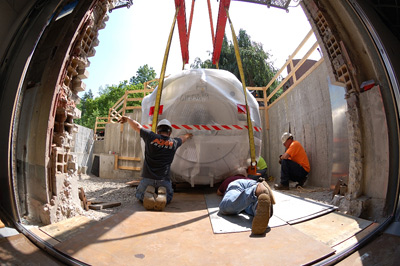The East Wing of Martha Van Rensselaer Hall houses the newly-delivered powerful magnetic resonance imaging (MRI) scanner. Researchers will now be able to achieve clear images during this fall. By non-invasive methods, the image can be obtained in rich tissue contrasts. Moreover, ionizing radiation is not involved.
 Workers move the MRI scanner into place through a cutout in the wall of MVR Hall
Workers move the MRI scanner into place through a cutout in the wall of MVR Hall
The 3 Tesla GE750 MRI scanner serves to be ideal for a variety of applications such as scientific studies for functional and structural investigations concerning plants and biomedical materials as well as humans and small animals.
The scanner will support the establishment of innovative technology development and cross-disciplinary collaboration amidst faculty from various disciplines, including plant and animal science, biomedical engineering, behavioral science, and neuroscience. Cornell will have more improved resources for visualizing and analyzing research data, contributing to discovery and expansion of educational potential for future researchers.
According to Professor Yi Wang, the MRI scanner revolutionizes in vivo imaging capability within the Ithaca campus, besides promoting Cornell's leading role in research.
Professor Valerie Reyna said that the MRI scanner fosters Cornell's potential to move beyond the boundaries of research in the biological, social, and physical sciences. Through this innovative tool, functions of active brain can also be observed.
The Rebecca Q. and James C. Morgan Dean of the College of Human Ecology, Alan Mathios commented that the 3.0T MRI scanner serves as a source for various researches, observation and other investigations to better understand human functions.
The National Institutes of Health and the Colleges of Arts and Sciences, Engineering, Human Ecology and Veterinary Medicine support the Cornell MRI Facility.